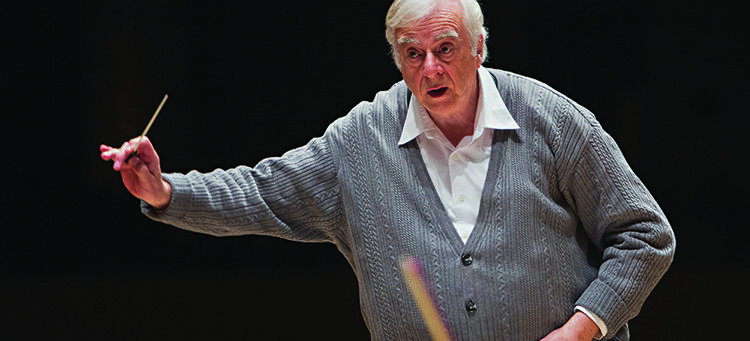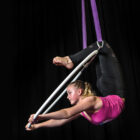
In the Spotlight
Michael Massey
By: Tom Murray | Photography: Stephanie Cragg
April, 2024
Keys to success and contribution to Canadian culture
When Michael Massey was very young he opted for Bach and Schubert over Elvis and Bill Haley.
“I didn’t really get those rock and skiffle groups of the time,” the London-born, Edmonton-raised pianist and composer acknowledges. “I started out singing in choirs in the church when I was nine, and playing piano when I was 10. That being said, I do believe that all music is relevant… except maybe country & western.”
There’s a mischievous sense of humour running through the conversation with Massey, who at the age of 78 has racked up an impressive number of honours since first putting his fingers on those ivory keys. Massey, who now resides in St. Albert, moved with his parents to Edmonton when he was 12, swapping Finchley, North London for a new home in the rougher Boyle Street area. Lacking a keyboard to practice on at his house, he found an upright at the McCauley school music room.
It wasn’t the best of situations, but thankfully someone was listening.
“Allan Rumbelow, who was the music supervisor for Edmonton Public Schools said, ‘You need a good teacher, kid.’ We got some names and my dad bought a piano. Luckily, we found an amazing teacher who was at Alberta College. That’s where it all started; it changed my life.”
That teacher was Jean-Pierre Vetter, who had moved from Switzerland only a couple of years before. Vetter had an outsized influence on the teenage Massey, who went on to earn a Bachelor of Music degree from the University of Alberta under the tutelage of Professor Alexandra Munn. After graduating in 1967, he decamped for Switzerland and more studies at the Geneva Conservatory.
He did well, picking up the Premier Prix de Virtuosité and twice performing as a soloist with L’Orchestre de la Suisse Romande. Europe was exhilarating for the young musician, and he attempted to extend his stay, even moving to London for a few years and trying his hand there. In the end, he moved back home to Canada. “Like most young graduating musicians I said to myself ‘Okay, what the hell do I do now?’ For me, it was going home, opening my studio to teach a bit and play as much as I can.”
That included cheekily auditioning for and gaining a seat in the cello section of the Edmonton Symphony Orchestra. Cello was Massey’s second instrument while studying at university, and while he doesn’t claim virtuosity, he does take a certain amount of impish pride in “faking it.” At the same time he was picking up piano gigs from the symphony, alternating as needed.
“It was part of the fun, I was good for them at the time and I did okay. I mean, I had literally no technique but I had a good ear and I could play the tunes nicely. I can make it sound nice. But any technical passages I faked like crazy. I was a good faker. Those were fun years.”
Massey chuckles.
Three years later, ESO assistant conductor John Barnum approached Massey with a proposition; he wanted the young musician to take up the job of Music Director for the Edmonton Youth Orchestra. The orchestra had gone through five conductors in the past two decades, but Massey, who was firmly ensconced as the ESO pianist, was game for the challenge. It’s turned into his greatest contribution to Canadian culture, as he’s held the position for 46 years now, with the EYO acknowledged as one of the best in the country. In the process he mentored countless musicians including Juno Award winning clarinetist James Campbell and Grammy- and Juno-nominated trumpet player Jens Lindemann.
“From my first lessons with Vetter I discovered that you always want to impart that teaching is part of learning as well,” he says about his role, which has led to him taking the orchestra all over the world on tours. “You learn things from putting experiences into words. Always be self- critical and self-analytical. We’re trying to find what to say with this music other than playing the notes.”
The awards and honours have flooded in over the past two decades. In 2002, Massey was the recipient of the Queen’s Golden Jubilee Medal, the same year that he was inducted into Edmonton’s Cultural Hall of Fame. There was the Alberta Order of Excellence in 2016, and the Lifetime Achievement in the Arts award by the City of St. Albert in 2017. Last year he was singled out for the Order of Canada, and when it finally arrives, he’ll find a space for it on the mantelpiece.
“You can always find a spot,” he chuckles. “It’s very nice, and the nice thing about something like that is that you don’t make millions of dollars in this profession. This isn’t something that you do for money; if that’s what you’re after you really should consider another occupation.”













